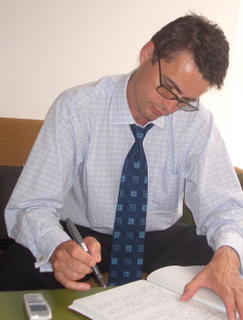
Written by Peter Hackney with Reg Domingo
City of Sydney Councillor Shayne Mallard and the NSW Council for Civil Liberties have added their voices to the growing list of people and organisations opposed to the 2am-10am lockout for licensed premises, which will apply to 50 venues across the state, including four gay venues, from Monday, December 1.
Liberal councillor Mallard (pictured) told the council’s third Gay, Lesbian, Bisexual and Transgender Community Forum, held at Sydney Town Hall last Tuesday, that the lockout was an unfair collective punishment that penalised innocent people along with the relatively small number of troublemakers.
“It’s a blunt instrument, a collective punishment for the entire community,” he said. “Two per cent of us are causing trouble and the rest of us are being punished.”
“There is a huge community uproar about it ... I’m getting information from people every day very upset about it.”
Mallard cast doubt on the NSW Bureau of Crime Statistics and Research (BOCSAR) figures used to select the 50 venues. The venues correlate to the top 50 licensed premises for police-reported incidents on BOCSAR’s database.
“I really wonder if the BOCSAR information is sophisticated enough,” said Mallard. “The Stonewall Hotel manager [has said], ‘I call the police anytime there’s a minor assault because I like to keep a very clean house.’ Now he’s being punished for that.”
“Don’t you think using BOCSAR figures like this will discourage [venues] from calling the police?” he asked Surry Hills Police Local Area Commander, Superintendent Donna Adney.
“No, I don’t,” she replied.
Supt Adney added that contrary to claims that BOCSAR data included incidents on footpaths and roads outside premises, it only related to incidents within a venue.
“There is a process whereby BOCSAR can ‘cleanse’ the data to show assaults in premises only,” she told the forum. “It’s not linking data – it’s about assaults in premises only.”
However, Supt Adney admitted that the lockout scheme was problematically selective, and she advocated a possible extension to the lockout, to include all licensed premises: “I would say it probably hasn’t gone far enough in that we have a proliferation of 24-hour and late-night trading venues along Oxford Street. T o put a 2am lockout on only four or five of them is problematic because you can just roll along to the very next venue.”
The NSW Council of Civil Liberties, however, was not convinced of the need for any lockouts at all, let alone an expansion of the scheme.
Stephen Blanks, Secretary of the NSW Council for Civil Liberties (CCL), said the lockouts were “a disproportionate response to a problem that is best handled in other ways”.
Ensuring venues’ adherence to existing responsible Service of Alcohol (RSA) laws was preferable to penalising the public, he said.
Blanks told SX that the NSW CCL intended to fight for patron’s rights: “We’ll be closely monitoring the lockout results to see whether there is any reduction in violence. We will lobby the appropriate authorities to ensure that their policies to reduce alcohol-related violence are effective and don’t infringe people’s civil liberties.”

No comments:
Post a Comment